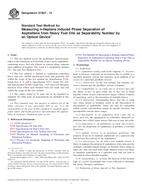Potřebujeme váš souhlas k využití jednotlivých dat, aby se vám mimo jiné mohly ukazovat informace týkající se vašich zájmů. Souhlas udělíte kliknutím na tlačítko „OK“.
ASTM D7827-12
Standard Test Method for Measuring n-Heptane Induced Phase Separation of Asphaltene from Heavy Fuel Oils as Separability Number by an Optical Device
Automaticky přeložený název:
Standardní zkušební metoda pro měření n-heptanu indukované fázové separaci asfaltény z těžkých topných olejů, jako oddělitelnosti číslo pomocí optického zařízení
NORMA vydána dne 1.11.2012
Informace o normě:
Označení normy: ASTM D7827-12
Poznámka: NEPLATNÁ
Datum vydání normy: 1.11.2012
Kód zboží: NS-39158
Počet stran: 5
Přibližná hmotnost: 15 g (0.03 liber)
Země: Americká technická norma
Kategorie: Technické normy ASTM
Kategorie - podobné normy:
Anotace textu normy ASTM D7827-12 :
Keywords:
asphaltene, asphaltene separation, compatibility, heavy fuels oils, phase separation, separability number, stability reserve, transmittance, ICS Number Code 71.080.10 (Aliphatic hydrocarbons)
Doplňující informace
| Significance and Use | ||||||||||||
|
5.1 This procedure describes a rapid and sensitive method for estimating the stability reserve of an oil. The stability reserve is estimated in terms of a separability number, where a low value of the separability number indicates that there is a stability reserve within the oil. When the separability number is between 0 to 5, the oil can be considered to have a high stability reserve and asphaltenes are not likely to flocculate. If the separability number is between 5 to 10, the stability reserve in the oil will be much lower. However, asphaltenes are, in this case, not likely to flocculate as long as the oil is not exposed to any worse conditions, such as storing, aging, and heating. If the separability number is above 10, the stability reserve of the oil is very low and asphaltenes will easily flocculate, or have already started to flocculate. 5.2 This test method can be used by refiners and users of heavy oils, for which this test method is applicable, to estimate the stability reserves of their oils. Hence, this test method can be used by refineries to control and optimize their refinery processes. Consumers of oils can use this test method to estimate the stability reserve of their oils before, during, and after storage. 5.3 This test method is not intended for predicting whether oils are compatible before mixing, but can be used for determining the separability number of already blended oils. However, experience shows that oils exhibiting a low separability number are more likely to be compatible with other oils than are oils with high separability numbers. |
||||||||||||
| 1. Scope | ||||||||||||
|
1.1 This test method covers the quantitative measurement, either in the laboratory or in the field, of how easily asphaltene-containing heavy fuel oils diluted in toluene phase separate upon addition of heptane. The result is a separability number (%). See also Test Method D7061. 1.2 The test method is limited to asphaltene-containing heavy fuel oils. ASTM specification fuels that generally fall within the scope of this test method are Specification D396, Grade Nos. 4, 5, and 6, Specification D975, Grade No. 4-D, and Specification D2880, Grade Nos. 3-GT and 4-GT. Refinery fractions from which such blended fuels are made also fall within the scope of this test method. 1.3 The values stated in SI units are to be regarded as standard. No other units of measurement are included in this standard. 1.4 This standard does not purport to address all of the safety concerns, if any, associated with its use. It is the responsibility of the user of this standard to establish appropriate safety and health practices and determine the applicability of regulatory limitations prior to use. |
||||||||||||
| 2. Referenced Documents | ||||||||||||
|
Doporučujeme:
Aktualizace zákonů
Chcete mít jistotu o platnosti užívaných předpisů?
Nabízíme Vám řešení, abyste mohli používat stále platné (aktuální) legislativní předpisy.
Chcete vědět více informací? Podívejte se na tuto stránku.




 Cookies
Cookies
